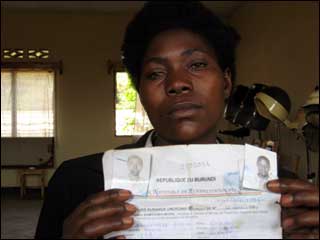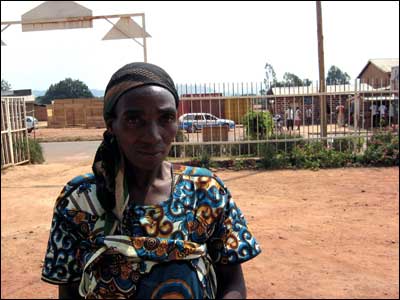
[Click here to listen to the podcast.]
Virginie Ntakarutimana wears a faded black suit jacket that hides scars she got when armed Tutsi soldiers raided her house on October 27, 1993, and slashed her with a machete.
The soldiers killed many Hutus that night, including 15 of her relatives, and forced her to flee to Tanzania.
After years in exile, she became one of the first of her family to return home to Ruyigi, an up-country village of unpaved roads in eastern Burundi. But upon arrival, she discovered that her land had been sold. And though her country is on the verge of peace, it’s the first time in her life she’s felt like killing another person, she said.
“The war is not finished,” she said. “I could bring machetes or weapons to beat them or kill them. I feel a spirit of war in myself, because we are neighbors but we can’t live peacefully with each other.”
As tens of thousands of refugees migrate back to Burundi, many are finding that neighbors and others displaced by the war have moved onto their land. The land clashes are raising concerns among aid workers and human rights organizations that the massive influx of refugees will spark renewed violence in a politically and economically unstable postwar country, where land is in short supply.
“Land issues are probably the main issues in Burundi,” said Eduardo Garcia Rolland, a protection advocacy adviser for the Norwegian Refugee Council in Burundi. “Most are coming back to find their land occupied by someone else — or someone else has sold the land, or the administration has confiscated the land.”
Burundi — a small, poor, East African country roughly the size of Maryland — is recovering from 13 years of war that left more than 300,000 people dead, displaced 117,000 internally, and forced 450,000 to flee abroad, mostly to Tanzania.
But the absence of fighting and a successful multiparty election have raised hopes for peace. Refugee organizations say they expect hundreds of thousands of people will return home to Burundi by the end of the year. In the last five years, 350,000 refugees have already returned.
As an incentive for refugees to return home, the United Nations High Commissioner for Refugees (UNHCR), the U.N. refugee agency, in July began giving $50 to returnees upon arrival in addition to other assistance already given — namely, household items plus a four-month’s food ration.
UNHCR reports that more than 8,000 refugees have returned home to Burundi since that time, and they plan to further repatriate more than 50,000 by the end of the year.
Faced with land disputes, many returnees are seeking recourse through the courts. The cases often pit neighbor against neighbor, families against friends.
Terence Nahimana, founder of Cercle d’initiative pour une vision commune (CIVIC), a conflict resolution organization which has held repatriation seminars at refugee camps in Tanzania, believes Burundi has enough land for all its 8.5 million citizens, most of whom depend on the land for subsistence farming.
But he expressed concern that Burundi’s judicial system does not have the resources or the appropriate laws on the books to deal with the returning refugees and the resulting land disputes.
“Land in Burundi is the main asset for everybody,” Nahimana said. “But the problem in this country is that there is no actual policy for repatriation.”

The lack of documentation and property deeds further complicate land disputes.
Denise Ntwawunda fled to Tanzania with her husband and nine children in the mid-1990s, only to return and become embroiled in a land dispute.
“The land is inherited,” she said. “But we don’t have any documents. It’s been our family’s land for generations. My father and my grandfather all lived on the land.”
Virginie Ntakarutimana, who still bears scars and feels at war with her neighbors, says she has all the proper records, as she rifles through piles of yellowing paperwork.
“I have documents that testify that the land is mine,” she said, clutching her passport photographs along with documents verifying her Burundi citizenship. “I prefer to get my land peacefully, but nothing is done.”
Ntakarutimana said she needs the land so she can feed herself and her children. She has AIDS and needs to eat before she takes her antiretroviral medication.
In Tanzania, she worked as a cleaner and then as a social worker counseling pregnant women in refugee camps. Now she can’t find a job.
Her anger and despair have left her wondering whether she should have left Tanzania. She has nowhere else to go now.
“I am happy I am back in my country, but I’ve wasted a lot of time seeking justice for my stolen land,” Ntakarutimana said. “In Tanzania, I could get food. Here, I don’t have peace in my heart. I don’t have peace in my heart.”
[Click here to listen to the podcast.]
- Follow us on Twitter: @inthefray
- Comment on stories or like us on Facebook
- Subscribe to our free email newsletter
- Send us your writing, photography, or artwork
- Republish our Creative Commons-licensed content

